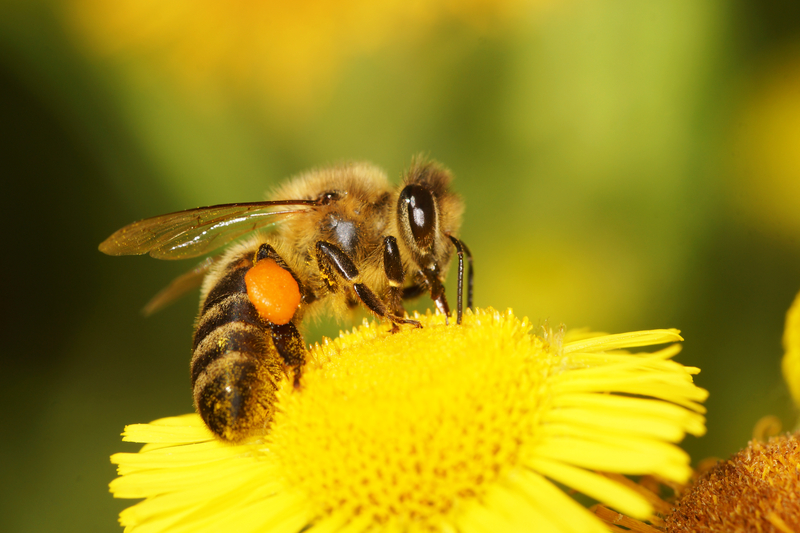Revitalizing Earth with Organic Waste Innovation
Posted on 22/09/2025
Revitalizing Earth with Organic Waste Innovation: A Green Revolution for Our Planet
In a world grappling with environmental challenges and increasing waste, organic waste innovation stands out as a powerful solution to help restore and revitalize Earth's natural health. Addressing organic waste not only reduces landfill burdens but also transforms what many see as 'trash' into valuable resources for sustainable agriculture, clean energy, and green communities. Join us as we explore how groundbreaking innovations in organic waste management are reshaping the planet's future and what part you can play in this transformative journey.

Understanding Organic Waste: Nature's Untapped Treasure
Before diving into innovation, it's essential to grasp what comprises organic waste and why its responsible management is so crucial:
- Food Scraps: The remains of fruits, vegetables, meat, dairy, and more from homes, restaurants, and supermarkets.
- Garden and Yard Clippings: Leaves, grass, branches, and other plant materials.
- Wood and Paper Products: Untreated timber, cardboard, and non-synthetic paper products.
- Agricultural Byproducts: Crop residues, animal manure, and related waste from farms and agro-industries.
Organic materials decompose naturally, unlike plastics and metals, offering unique opportunities for revitalization if managed correctly. Yet, when improperly disposed of in landfills, they produce methane--one of the most potent greenhouse gases. This is why innovations in organic waste management hold the key to environmental sustainability.
Organic Waste Innovation: Breathing New Life into Our Planet
The Problem with Conventional Waste Disposal
Traditional waste disposal systems, such as landfilling and open burning, come with a host of environmental issues:
- Greenhouse Gas Emissions: Organic waste decomposition in oxygen-poor landfills releases methane, accelerating global warming.
- Soil and Water Pollution: Leachate from decaying waste can contaminate soil and groundwater.
- Resource Wastage: Valuable nutrients and organic matter are lost instead of being recycled into the ecosystem.
Game-Changing Solutions: Organic Waste Innovation in Action
As the world awakens to sustainability, innovative technologies and methods are reshaping how societies handle organic waste, driving a new era of earth revitalization. Here are some groundbreaking approaches leading the charge:
1. Composting 2.0: Advanced & Community-Driven Approaches
Composting has moved beyond the backyard pile. Modern advancements include:
- In-Vessel Composting: Enclosed systems allow for controlled environments, speeding up decomposition and reducing odors, while enabling urban participation.
- Aerated Static Pile (ASP): Forced aeration enhances oxygen levels, creating high-quality compost much faster than traditional methods.
- Community Compost Hubs: Neighborhoods and cities establish shared composting facilities, fostering local engagement and redistributing nutrient-rich humus back into parks and gardens.
Benefits:
- Reduces landfill emissions and volume.
- Creates fertile soil amendments, promoting sustainable agriculture.
- Empowers communities through education & participation.
2. Anaerobic Digestion: Turning Waste to Clean Energy
Anaerobic digestion involves bacteria breaking down organic matter without oxygen, resulting in biogas (a mix of methane and CO2) and nutrient-rich digestate. This technology is increasingly integrated in farms, cities, and even food processing plants:
- Biogas Capture: Used as a renewable energy source to heat homes, power vehicles, or fed into the electrical grid.
- Biofertilizer Production: The resulting digestate is a natural fertilizer, supporting circular agriculture.
- Emission Reduction: Diverting organic waste from landfill prevents methane release into the atmosphere.
Case Example: Various municipalities worldwide now operate biogas plants that power their bus fleets, illustrating the scalable impact of organic waste innovation.
3. Black Soldier Fly Larvae: Nature's Rapid Recyclers
Insects like Black Soldier Fly larvae are revolutionizing waste conversion. These voracious eaters can break down vast amounts of organic matter in a short time. The best part? The larvae become high-protein meal for livestock or aquaculture, while their castings serve as potent plant fertilizer.
- Fast Decomposition: Large volumes processed in days, not weeks.
- Resource Efficiency: Less land, energy, and water required compared to traditional composting.
- Valuable Byproducts: Animal feed and quality soil amendments for agriculture.
4. Biochar Production: Locking Carbon into the Soil
Biochar is a charcoal-like substance created by burning organic matter ("pyrolysis") in the absence of oxygen. When added to soil, it enhances fertility, retains water, and locks away carbon for centuries--fighting climate change.
- Carbon Sequestration: Captures and stores carbon that would otherwise contribute to atmospheric CO2.
- Soil Enhancement: Improves crop yields, reduces fertilizer demand, and mitigates drought impacts.
5. Smart Waste Collection & Sorting Technologies
Emerging AI-powered sorting systems, sensor-equipped organic bins, and data-driven collection schedules ensure that organic waste is properly separated and managed--maximizing its recovery and minimizing pollution.
- Improved Recycling Rates: Ensures less contamination, making the subsequent treatment processes more efficient.
- Labor and Cost Reduction: Automated systems reduce the need for manual sorting, lowering costs and errors.
Benefits of Organic Waste Solutions: Why Innovation Matters
Environmental Impact
- Lower Greenhouse Gas Emissions: Diverting organic matter from landfills slashes methane output, a key goal in climate action plans.
- Soil Regeneration: Compost and biochar restore degraded soils, improving crop productivity and food security.
- Landfill Longevity: Organic waste makes up a significant chunk of municipal waste. Innovation extends landfill lifespan and delays the need for new sites.
- Clean Energy Production: Biogas offers an alternative to fossil fuels, supporting a circular, low-carbon economy.
Economic and Social Upsides
- Resource Efficiency: Turning waste into energy, feed, or fertilizer generates value and new revenue streams.
- Local Job Creation: Composting centers, biogas plants, and collection networks open up skilled and unskilled jobs for local communities.
- Food Security: Enhanced soil health increases sustainable food production.
- Public Engagement: Community-driven programs raise environmental awareness and involve people in sustainable practices from the ground up.
Organic Waste Innovation Around the World: Success Stories
Countries, cities, and companies are embracing organic waste innovation at every scale. Here are some inspiring examples:
- San Francisco, USA: One of the first cities with mandatory composting, diverting 80% of waste from landfill by separating food and yard waste from trash.
- Sweden: Nearly half of the country's food waste is processed into biogas, powering public transport and homes while reducing emissions.
- Africa: Startups like Sanergy in Kenya use Black Soldier Flies to convert waste into animal feed and fertilizer, providing economic opportunities and improving sanitation.
- India: Urban bio-composting initiatives turn market waste into nutrient-rich products for farmers, transforming trash into treasure.
How You Can Support Earth Revitalization with Organic Waste
Individual Actions
- Separate food scraps and yard waste at home; start composting if possible.
- Participate in municipal or community-run organic waste collection programs.
- Support producers and brands investing in circular and zero-waste strategies.
- Reduce food waste by planning meals and using leftovers creatively.
Community & Business Initiatives
- Establish or join local composting co-ops or hubs.
- Encourage restaurants and grocers to donate unsold edible food and compost remaining scraps.
- Invest in smart collection bins and partner with bioenergy projects.
- Educate neighbors or employees on the benefits and how-tos of organic waste separation.
Advocacy & Policy
- Advocate for policies mandating organic waste diversion from landfills.
- Support incentives for businesses adopting biogas, composting, and biochar production.
- Participate in public campaigns raising awareness of the environmental and economic benefits of organic waste recycling.

Challenges and The Road Ahead
While organic waste solutions are rapidly advancing, they face ongoing hurdles:
- Infrastructure Gaps: Many regions lack sufficient facilities for composting or anaerobic digestion.
- Public Participation: Success requires widespread education and behavioral change.
- Policy and Investment: Consistent support is vital for scaling innovation and integrating it with existing systems.
- Contamination: Non-organic materials can disrupt processing, underscoring the need for better sorting.
However, as governments, industries, and communities recognize the urgent need to revitalize Earth with sustainable waste strategies, momentum is growing. Emerging technologies, supportive legislation, and educational campaigns are rapidly bridging the gap between potential and practice.
Conclusion: A Greener Future with Organic Waste Innovation
Revitalizing Earth with organic waste innovation isn't just a technological achievement - it's a global movement to restore nature's balance and ensure future generations inherit a healthier world. By reimagining what we do with kitchen scraps, garden trimmings, and agricultural byproducts, we can reduce emissions, enrich soils, produce clean energy, and create new opportunities for people everywhere.
Small actions--whether composting at home, supporting bioenergy programs, or advocating for change--multiply into large-scale environmental revitalization. Together, we can transform waste into wealth, pollution into possibility, and today's challenges into tomorrow's thriving ecosystems.
Join the organic waste innovation revolution, and help breathe new life into our precious planet. Your role, no matter the size, is vital in shaping a more sustainable, resilient Earth for all.
Frequently Asked Questions (FAQ) About Organic Waste Innovation
- Q: What is the main goal of organic waste innovation?
A: The main goal is to reduce pollution and climate impact by transforming organic waste into valuable products like compost, biogas, and biofertilizer, enabling a circular and sustainable economy. - Q: How does composting help the environment?
A: Composting diverts organic material from landfills, reduces methane emissions, and creates nutrient-rich soil amendments that promote plant growth naturally. - Q: Can businesses benefit from organic waste management?
A: Absolutely. Businesses can reduce disposal costs, gain from producing energy/fertilizer, and enhance their environmental reputation. - Q: What role do individuals play in revitalizing Earth through waste innovation?
A: Individuals drive the change by adopting better waste practices at home, supporting sustainable businesses, and spreading awareness in their communities.
For more tips, strategies, and updates about revitalizing Earth with organic waste innovation, stay tuned to our blog and join the growing global community committed to a cleaner, greener, and more resilient planet.

